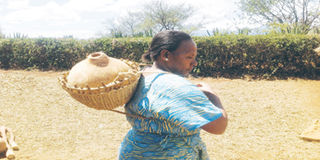A glimpse into the Iraqw people's history

A woman carrying the traditional clay pots of the Iraqw people
What you need to know:
In Bashay village, history is as unique as the flora and fauna in its surrounding. Bashay is the perfect base from which to explore the Iraqw tribe history, believed to originate from the present-day Iraq. Yes, you got me right. I mean the country in the middle east that dominated the news and attention of the world for nearly two decades until its President Saddam Hussein was captured and killed.
It may sound strange visiting a village but what I have learned over decades of travelling, every travel experience is unique and memorable. Each has a flavour of its own and gives you a new way of seeing things.
And so was my recent visit to Bashay cultural village situated a short distance from Karatu town in Arusha region. I absolutely like visiting rural communities. Such visits continue to open my eyes not only to the communities’ way of life, but to my own.
In Bashay village, history is as unique as the flora and fauna in its surrounding. Bashay is the perfect base from which to explore the Iraqw tribe history, believed to originate from the present-day Iraq. Yes, you got me right. I mean the country in the middle east that dominated the news and attention of the world for nearly two decades until its President Saddam Hussein was captured and killed.
Learning about the Iraqw way of life, and their strong connection to the past history of Iraq and the spirituality they find through nature was inspiring. They know little about the world outside their village, but they live with a profound sense of peace. They are free of the stresses of much of modern life, societal expectations of success, the dangers of technology, and other woes.
The historic village is only twenty minutes from the Ngorongoro crater gate, making it an added attraction near the Ngorongoro, which has always been a great holiday break for city slickers and tourists.
Recently in the company of Mr Elirehema Maturo, the coordinator of the Tanzania Cultural Tourism Programme based in Arusha, we were hosted by a brilliant story-teller and pastor, Gabriel Shangwe who told us stories about the Iraqw history.
Pastor Shangwe is the founder of a local cultural enterprise known as Sandemu Iraqw Art and Culture Promoters. It was established in 2000 with the main agenda of disseminating information on the Iraqw history and culture. It now involves locals in various cultural tourism activities and it has a cultural traditional dance group.
The pastor narrated to us the history of the Iraqw people, the main ethnic group in Karatu and Mbulu districts with a minority of them found way off in Babati and Hanang districts. The migration journey of the Iraqw originated from the Euphrates and Tigris rivers in the Middle East over 500 years ago. He says, the Iraqw, came from Mesopotamia through Egypt, Ethiopia, Somalia and Kenya. There are notable similarities between the Iraqw language and the languages spoken in Ethiopia and Somalia.
Pastor Shangwe said the Iraqw migration journey is said to have been forced by drought and other natural calamities. They first settled in Ethiopia for close to one thousand years before moving on to Somalia where they stayed for less than 200 years.
In Ethiopia, according to Shangwe, they are linked to the origin of the Queen of Shebba who is believed to have shared some relationship with King Solomon, the wisest person of the Biblical times.
On their journey to Tanganyika, now Tanzania they passed through Western Kenya then finally settled in the Ngorongoro area before the Maasais and Datogas chased them away after they fought in wars and were defeated, having lived in the area for 200 years.
The Iraqw are said to be the first tribe to settle in Ngorongoro area. Their next destination was central Tanganyika, now Tanzania near the towns bordering Dodoma, Mbulu and Singida.
And later during the British colonial rule, they claimed their former land in Ngorongoro. To prove their claim, as requested by the colonials, they dug up a clay pot and grinding stone they had earlier secretly buried in the ground.
Despite the evidence having been accepted, the Iraqw people were not allowed to return to the Ngorongoro area, which was gazetted as a protected area. The Maasais, however, were allowed to stay at Ngorongoro because, according to the British, they were wildlife-friendly human beings. So the Iraqw people were pushed away some 30 kms out of Ngorongoro.
Shangwe walked us through the traditional house, and it was not just this traditional house that is extraordinary, but the traditional wares - weapons, garments, gourds, baskets, mats, clay pots and grinding stones on display, all tell the history of the last millennia.




